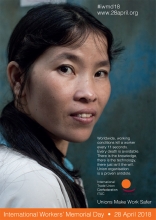28 April: fight for safe, healthy and decent workplaces

7,850 workers die every day from accidents at the workplace or occupational diseases stemming largely from poor working conditions. 2.78 million workers continue to die each year from work-related injuries and illnesses. 2.4 million of these deaths can be attributed to work-related diseases alone.
The international trade union movement has marked 28 April as the International Commemoration Day for Dead and Injured Workers since 1996. We mourn our fallen sisters and brothers on this day and equally mobilise public opinion around the demands of the working class for occupational safety and health safeguards.
Since 2003, at the instance of the trade unions, the International Labour Organisation has stepped into the ceremonies marking this solemn day, as the World Day for Safety and Health at Work. With themes, which address occupational safety and health gaps, the Day is set aside for actions and reflections by workers and other constituents of the ILO aimed at ensuring safe and healthy workplaces.
This year, unions will focus on the scourge of occupational cancers, which is responsible for much of the 2.4 million deaths related to occupational diseases each year. More than 10% of cancers result from exposure to hazardous substances in the workplace.
ILO on its part is using the day to campaign for safe and secure working environments for all workers by 2030. In this regards it is highlighting the generational component of this quest with a call for improvement of the safety and health of young workers and ending child labour.
Rosa Pavanelli, the PSI General Secretary expressed the concerns of millions of workers on the day, when she said:
Occupational safety and health concerns are very important for PSI. And these must be taken seriously by governments. We should not shed crocodile tears about workers sacrificing their lives in the line of duty, when necessary measures to safeguard their safety and health at work are not taken when they should have been taken.
Workplace violence, harassment, and work-related stress are taking on alarming dimensions because of prioritization of profit over workers. This situation is worsened where workers and trade union rights are circumscribed.
Tens of millions of workers today suffer from depression. And this could be fuelling a rise of occupational suicides.
When Seon-wook Park, a young nurse working at the Asian Medical Centre in Seoul died by throwing herself out of the window of an apartment close to the hospital on 15 February, she left a note. In it, she pointed to work-related stress, including long working hours and harassment by superiors, as reasons for the desperate decision to take her life. As we mourn, Seon-wook and almost three million other sisters and brothers we avoidably lose each year, we must all strive for a future of work in which people and not profit is at the driving concern.
Women and men delivering public services across several sectors are daily confronted by occupational hazards. These include physical, mental, social, chemical and psychological hazards, depending on which sector they work. The least that governments at all levels can do is to ensure improvements in safety conditions at the workplace.
As workers and trade unions, we must deepen our collective power, by organising. Unionised workplaces tend to be safer workplaces. A vibrant union which binds leadership at all levels with the rank and file membership is also more likely to identify and fight against unsafe and unhealthy practices in the workplaces.
As we remember martyrs of the world of work, we owe the next generation the debt of organising to make our workplaces safe and healthy, and our society one which puts people over profit.

